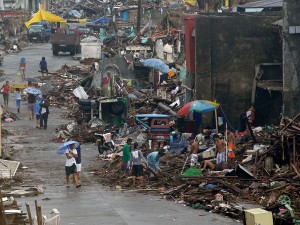MANILA, Philippines—The government’s Post-Disaster Needs Assessment (PDNA) completed in March by the Office of Civil Defense is a detailed two-inch thick report put together by more than 500 people in a three-month period.
On April 30, the PDNA was formally transmitted to the National Economic and Development Authority (Neda), which is in charge of the recovery and reconstruction plan post-Supertyphoon “Yolanda.”
“The PDNA is like the raw material which serves as the basis for the rehabilitation plan. [The goal] to build back better is Neda’s call,” a well-placed government source told the Inquirer yesterday, requesting anonymity for lack of authority to speak to the media.
The source showed the Inquirer the draft PDNA that was completed last March by the multi-agency team led by the National Disaster Risk Reduction and Management Council, after Secretary Panfilo Lacson expressed his frustration over the government’s rehabilitation efforts in the Yolanda-stricken provinces.
Duplication of data
The draft indicated that some P106 billion would be needed for the reconstruction and recovery effort. But after a review of the document and a “duplication [of data] in some areas” was spotted, the amount was trimmed to P104.64 billion.
The typhoon-affected areas included in the PDNA report were Tacloban City, Leyte, Eastern Samar, Southern Leyte, Samar, Biliran, Panay Island, northern Palawan and northern Cebu.
The municipalities covered by the PDNA were within the 50-kilometer track of Yolanda which hit Central Visayas and nearby provinces on Nov. 8, packing maximum winds of 235 kilometers per hour. Yolanda (international name “Haiyan”) was the most powerful typhoon to ever make landfall.
According to the PDNA, the total effect peso-wise of Yolanda amounted to some P130.4 billion, “with damage accounting for 71 percent and [opportunity] losses 29 percent.”
Meanwhile, in Tacloban, residents still searching for missing loved ones may finally find closure six months after Yolanda devastated the city.
A team from the National Bureau of Investigation in Manila will conduct antemortem identifications of 2,255 bodies that remain unidentified.
Acting city administrator Jennylyn Manibay said the Tacloban government asked the NBI for help in identifying the victims.
“This is the least the city government can do to provide comfort and closure to the relatives who had lost their loved ones,” Manibay said.
DNA matching
Of the bodies that had yet to be unidentified, 2,243 were buried in a mass grave at Holy Cross Cemetery in Barangay Diit.
Relatives of the missing can go to the Balyuan Convention Center beginning May 19 to register. The taking of blood samples and dental swabs will be done alphabetically. The samples extraction will end on July 7.
Qualified to give samples are parents and children of victims.
The samples will be sent to the NBI office in Manila. Their DNA will be matched with the DNA taken from the bones and tissues of unidentified victims.
Dr. Charina Labrador, NBI Disaster Victims Identification chief, said she could not say how long it would take to complete the procedure.
She said the matching would be done free of charge. Under ordinary circumstances, DNA matching costs P20,000. With a report from Joey A. Gabieta, Inquirer Visayas
RELATED STORIES
Only 11 mayors submitted ‘Yolanda’ rehab plans–Lacson
Aquino approves in principle ‘Yolanda’ rehabilitation plan
P598-B funds from 2012 eyed for ‘Yolanda’ rehabilitation plan
